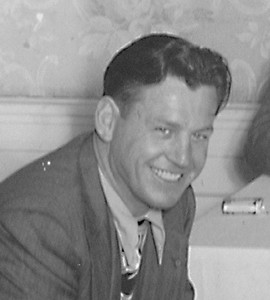
James Daugherty, an energetic union organizer for the CIO, helped Ron Weakley’s campaign to establish a CIO union at PG&E. Daugherty was later a target of red-baiting by the UWUA. Utility Workers Union of America
After the war, the Utility Workers Organizing Committee became a full-fledged national union, the Utility Workers Union of America (UWUA). Its western regional director was James Daugherty, an extraordinary organizer who was assisting Ron Weakley’s union drive at PG&E. But UWUA’s national leaders didn’t like Daugherty’s left-wing politics. At the union’s national convention in 1947, they were determined to use the new Taft-Hartley law to force Daugherty to resign.
Taft-Hartley restricted union security provisions in labor agreements, restricted unions from taking various actions in solidarity with other unions, and required all union officers to sign affidavits swearing that they did not belong to the Communist Party. Any officer who refused to sign the affidavit could be “branded” as a communist—even though it was not a crime to be a communist—and could be forced out of office. The tactic was called red-baiting.
At the 1947 convention, UWUA officers publicly taunted James Daugherty to sign the affidavit. He refused. Weakley hated red-baiting and rose to Daugherty’s defense, saying that Daugherty was supported by the “overwhelming majority” of California Utility Workers.
Weakley then issued a veiled warning that West Coast locals might leave the UWUA if it forced Daugherty out. Shortly thereafter, the UWUA expelled Daugherty from the union.
In defending Daugherty against red-baiting, Weakley was ahead of his time. In 1954, the nation’s leading red-baiter, Senator Joseph McCarthy, was censured by the U.S. Senate. In 1965, the U.S. Supreme Court affirmed that the Taft-Hartley affidavit requirement was unconstitutional.